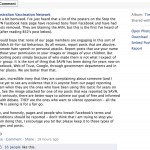Social Media
Gabriella Coleman's Hacker, Hoaxer, Whistleblower, Spy: The Many Faces of Anonymous is largely a laudatory history of the Anonymous hacker activist movement with some anthropological and political analysis. Whitney Phillips' This Is Why We Can't Have Nice Things: Mapping the Relationship between Online Trolling and Mainstream Culture on the other hand, is much more geared towards an analytical and philosophical analysis of past and present (and even future) of how online trolling relates to contemporary culture.
Neither book is perfect, and both tend to falter where it comes to how closely…
Analyzing online searches and social media activity has often been suggested as a way to track and maybe even predict the spread of diseases. And it’s a great idea — if it’s done right, it could offer public health workers real-time surveillance and a jumpstart at containing dangerous outbreaks. But there’s a hitch. How can we attempt to decipher between online activity triggered by the possibility of actual disease symptoms and online activity triggered by simple curiosity?
That was the question Sherry Towers and her colleagues set out to answer. At the very least, they wanted to gain some…
What is digital governance in the first place?
Digital governance is a discipline that focuses on establishing clear accountability for digital strategy, policy, and standards. A digital governance framework, when effectively designed and implemented, helps to streamline digital development and dampen debates around digital channel “ownership.”
-- From the Managing Chaos: Digital Governance by Design website.
Universities
Intellectual autonomy and stubbornness of staff
-- From the index, Managing Chaos: Digital Governance by Design, p. 229
Time to take a little medicine! All those…
While I was reading Cory Doctorow's Information Doesn't Want to Be Free: Laws for the Internet Age, I was reminded of a quote of his that I blogged about a few years ago:
The people in Makers experience a world in which technology giveth and taketh away. They live through the fallacy of the record and movie industries: the idea that technology will go just far enough to help them and then stop. That’s totally not what happens. technology joes that far and them keeps on going. It’s a cycle of booms and busts. There are some lovely things about when you’re riding the wave and some scary things…
One of the most common criticisms launched at defenders of science-based medicine by believers in pseudoscience and quackery is that we are “pharma shills.” The assumption, or so it would seem, is that no one would defend science, reason, and medicine unless he were paid off by pharmaceutical, chemical, and/or agricultural companies. The further assumption is that, in contrast to our greedy grasping selves, they are not motivated by such base concerns as money. That is their self-image, that of pure-hearted warriors against evil, the evil being big pharma, big agriculture, big chemical,…
As part of the celebrations for Canada's upcomming 150th birthday, the Canadian federal government has released its Digital Canada 150 strategy paper, and while it`s not all bad, at the same time there is not an awful lot to recommend it. Especially considering it was four years in the making.
My sense is that its main purpose is for the Harper Conservative government to be able to say it has a digital strategy during the next election campaign in 2015. The most telling thing about the strategy, of course, is which department it originated in: Industry Canada. Not Culture, not Heritage, not…
This is not what I wanted to write about for my first post of 2014, but unfortunately it's necessary—so necessary, in fact, that I felt the obligation to crosspost it to my not-so-super-secret other blog in order to get this information out to as wide a readership as possible.
I've always had a bit of a love-hate relationship with Facebook. On the one hand, I like easily how it lets me stay in contact with family and friends across the country, people whom I would rarely see more than once or twice a year, if even that. On the other hand, I have the same privacy concerns that many other…
Yes, another science blogging community among the many and yet another where an established print magazine enhances its online presence with a blogging network. And a bit more shuffling of the chairs on the deck as people with established blogs switch places or even some people start up whole new blogging personas.
The Popular Science Blogging Network!
Here's the welcome post and the list of blogs
Welcome To The Popular Science Blog Network
Today we’re unveiling 13 new blogs on PopularScience.com, each one home to a notable writer covering a specific area of innovation. We live in an era…
On May 20th, 2013 I published my most popular post ever. It was The Canadian War on Science: A long, unexaggerated, devastating chronological indictment. In it, I chronicled at some considerable length the various anti-science measures by the current Canadian Conservative government. The chronological aspect was particularly interesting as you could see the ramping up since the 2011 election where the Conservatives won a majority government after two consecutive minority Conservative governments.
As an exercise in alt-metrics (and here), I thought I would share some of the reactions and…
Some colleagues and I are presenting tomorrow at the latest Ontario Library Association Super Conference. Here's the info:
Session: #1307:
Friday 3:45 PM 5:00 PM
IF I KNEW THEN WHAT I KNOW NOW
Career development
Speaker(s)
John Dupuis, Acting Associate University Librarian, Information Services, York University; Tanis Fink, Director, Seneca Libraries, Seneca College; Amanda French, Manager, Sciences and Business Dept, Mississauga Library System; Klara Maidenberg, Virtual Reference Services & Assessment and Evaluation Librarian, Scholars Portal, OCUL; Zachary Osborne, Head Librarian,…
Yes, the science blogging community has certainly seen some gyrations in the last few years with a bunch of new networks sprouting up, sometimes from the ashes of other networks, sometimes completely on their own.
The latest is Phenomena: A science salon hosted by National Geographic magazine.
Phenomena is a gathering of spirited science writers who take delight in the new, the strange, the beautiful and awe-inspiring details of our world. Phenomena is hosted by Jamie Shreeve, Executive Editor for Science at National Geographic magazine, who invites you to join the conversation.
So far at…
As I mentioned way back on October 22nd, I was kindly invited to give a talk at the Brock University Physics Department as part of their seminar series. The talk was on Getting Your Science Online, a topic that I'm somewhat familiar with! Since it was coincidentally Open Access Week, I did kind of an A-Z of online science starting with the various open movements: access, data and notebooks. From there I did a quick tour of the whys and wherefores of blogs and Twitter.
There was a good turnout of faculty and grad students with lots of great questions and feedback, some more skeptical that…
It seems that Brock University in St. Catherine's, Ontario really likes me. Two years ago, the Library kindly invited me to speak during their Open Access Week festivities. And this year the Physics Department has also very kindly invited me to be part of their Seminar Series, also to talk about Getting Your Science Online, this time during OA Week mostly by happy coincidence.
It's tomorrow, Tuesday October 23, 2012 in room H313 at 12:30.
Here's the abstract I've provided:
Physicist and Reinventing Discovery author Michael Nielsen has said that due to the World Wide Web, “[t]he process of…
Personally, I aspire to being a Social Media Smurf.
Check out this amusing yet pointed post by Eric Stoller: You Are Not a Social Media Jedi, Ninja, Sherpa, or Guru.
A little taste:
They are everywhere. On Twitter profiles, blog bios, and Facebook pages across the social media sphere, inflated social media titles are rampant. People claiming to be experts with social media as they bask in the warm glow of 7 Twitter followers. Seriously, they are found in countless numbers on the web. Some people are even promoting themselves as Pinterest experts. That's almost as funny as the consultants who…
This one is a little less on the strictly amusing side and a little more on the useful and thoughtful side for a Friday Fun post, but sometimes it's worth mixing things up a bit.
I've mostly not read these books myself but I am in the middle of the Christensen/Eyring book right now. And they all look very useful and interesting, if only as a springboard for disagreement and debate. A little bit of end-of-summer reading is always a good thing!
Without further ado, from OnlineUniversities.com, the 10 Best Books on the Future of Higher Ed.
Higher Education?: How Colleges Are Wasting Our Money…
Dying of cancer can be a horrible way to go, but as a cancer specialist I sometimes forget that there are diseases that are equally, if not more, horrible. One that always comes to mind is amyotropic lateral sclerosis (ALS), more commonly known as Lou Gehrig's disease. It is a motor neuron disease whose clinical course is characterized by progressive weakness, muscle atrophy and spasticity, with ultimate progression to respiratory muscles leading to difficulty breathing and speaking (dysarthria) and to the muscles controlling swallowing. The rate of clinical course is variable, often…
I'd like to extend a huge science librarian blogosphere welcome to Information Culture, the newest blog over at Scientific American Blogs!
This past Sunday evening I got a cryptic DM from a certain Bora Zivkovic letting me know that I should watch the SciAm blog site first thing Monday morning. I was busy that morning but as soon as I got our of my meeting I rushed to Twitter and the Internet and lo! and behold!
Information Culture: Thoughts and analysis related to science information, data, publication and culture.
I'm always happy to see librarians invading faculty and researcher blogs…
Klout is kind of evil. Basically, it's the impact factor for the Web, where this random company uses a mysterious algorithm to quantify and rank people's standing on social media -- Twitter, Facebook, etc.
There's been some interesting commentary about it on teh interwebs these lasts few days, such as It's terrifying how important your Klout score has become, Klout Is Important Even If You Aren't Using It and What Your Klout Score Really Means. Lots of interesting and mostly measured and rational commentary and analysis.
And along comes Klouchebag.com into the fray and blows it all up.
From…
It's probably best to start with what Marc J. Kuchner's new book -- Marketing for Scientists: How to Shine in Tough Times -- isn't.
It isn't a social media jackass recipe book for "Success through Twitter." It isn't a detailed treatise on marketing theory. It doesn't come with a guarantee of grants, publications and prizes if you follow it's instructions. In fact, it's hardly about Twitter or blogs or Facebook or Pinterest or any of that stuff at all.
Instead, it's a primer on why getting your message out is a good idea.
Marketing for humans, in other words, where humans = scientists.
Kuchner…
I was really angry riding home on the bus last Friday night. Not angry because the transit system here in Toronto is royally fudged in general or that transit to York University is fudged in particular.
No, it wasn't that particular aspect of the public sphere that had me upset.
It was the growing tendency of publishers of all sorts to try and take their works out of the public cultural commons and place them exclusively behind pay walls. It's their desire to monetize every reading transaction that had me hot under the collar.
Here's what I tweeted standing on the bus, altered a bit for…

